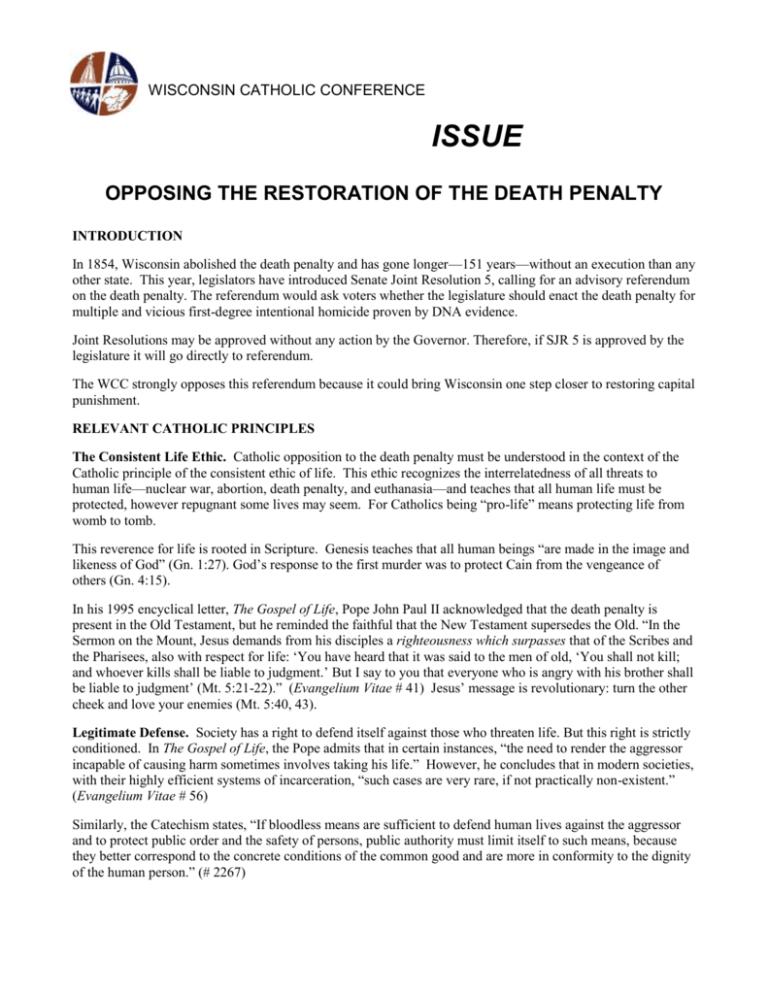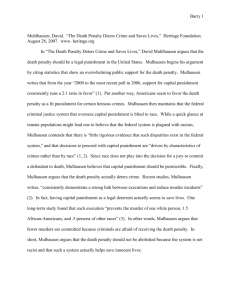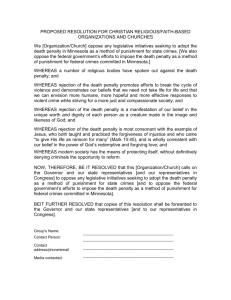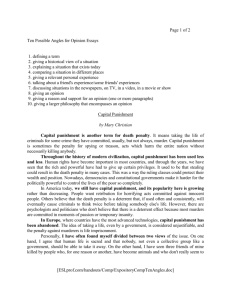Opposing the Restoration of the Death Penalty
advertisement

WISCONSIN CATHOLIC CONFERENCE ISSUE BRIEF OPPOSING THE RESTORATION OF THE DEATH PENALTY INTRODUCTION In 1854, Wisconsin abolished the death penalty and has gone longer—151 years—without an execution than any other state. This year, legislators have introduced Senate Joint Resolution 5, calling for an advisory referendum on the death penalty. The referendum would ask voters whether the legislature should enact the death penalty for multiple and vicious first-degree intentional homicide proven by DNA evidence. Joint Resolutions may be approved without any action by the Governor. Therefore, if SJR 5 is approved by the legislature it will go directly to referendum. The WCC strongly opposes this referendum because it could bring Wisconsin one step closer to restoring capital punishment. RELEVANT CATHOLIC PRINCIPLES The Consistent Life Ethic. Catholic opposition to the death penalty must be understood in the context of the Catholic principle of the consistent ethic of life. This ethic recognizes the interrelatedness of all threats to human life—nuclear war, abortion, death penalty, and euthanasia—and teaches that all human life must be protected, however repugnant some lives may seem. For Catholics being “pro-life” means protecting life from womb to tomb. This reverence for life is rooted in Scripture. Genesis teaches that all human beings “are made in the image and likeness of God” (Gn. 1:27). God’s response to the first murder was to protect Cain from the vengeance of others (Gn. 4:15). In his 1995 encyclical letter, The Gospel of Life, Pope John Paul II acknowledged that the death penalty is present in the Old Testament, but he reminded the faithful that the New Testament supersedes the Old. “In the Sermon on the Mount, Jesus demands from his disciples a righteousness which surpasses that of the Scribes and the Pharisees, also with respect for life: ‘You have heard that it was said to the men of old, ‘You shall not kill; and whoever kills shall be liable to judgment.’ But I say to you that everyone who is angry with his brother shall be liable to judgment’ (Mt. 5:21-22).” (Evangelium Vitae # 41) Jesus’ message is revolutionary: turn the other cheek and love your enemies (Mt. 5:40, 43). Legitimate Defense. Society has a right to defend itself against those who threaten life. But this right is strictly conditioned. In The Gospel of Life, the Pope admits that in certain instances, “the need to render the aggressor incapable of causing harm sometimes involves taking his life.” However, he concludes that in modern societies, with their highly efficient systems of incarceration, “such cases are very rare, if not practically non-existent.” (Evangelium Vitae # 56) Similarly, the Catechism states, “If bloodless means are sufficient to defend human lives against the aggressor and to protect public order and the safety of persons, public authority must limit itself to such means, because they better correspond to the concrete conditions of the common good and are more in conformity to the dignity of the human person.” (# 2267) Punishment and Rehabilitation. Punishment is never an end in itself, but rather a means to restoration and redemption. This restoration of order involves not just protecting society from future attacks, but also “offering the offender an incentive and help to change his or her behavior and be rehabilitated.” (Evangelium Vitae # 56) EVALUATING DEATH PENALTY ARGUMENTS There are three principal arguments for capital punishment, none of which justify restoring it in Wisconsin. Public Safety. Our state’s rejection of the death penalty has not compromised public safety. Wisconsin’s homicide rate is far lower than many states that have the death penalty, so our pro-life approach to crime and punishment serves us well. Few violent prisoners ever escape and almost all who do are captured before they can commit another violent crime. Closure for Victims’ Families. One of the most compelling reasons for reinstating the death penalty is the belief that it will ease the suffering of the victim’s family and help to bring closure. While the desire to see the perpetrator punished is natural, society does not foster the value of life by taking it. As the Bishops wrote in their 1995 statement, Capital Punishment in Wisconsin: “we honor the dead more eloquently by rejecting the barbarism that caused their deaths in favor of the mercy and gentleness by which decent people live their lives…Instead of extending the ‘culture of death’ further across our society, we urge our fellow citizens to embrace the example of God’s response to Cain and to heed the words of Jesus, who ordered his follower to return his sword to his sheath (Jn. 18:12).” Proportionate Justice. Some defend the death penalty on the grounds of proportionate justice: the ultimate crime deserves the ultimate punishment. But proportionality requires fairness as well. Our judicial system cannot ensure that only the guilty are executed and that capital punishment is imposed equally on all who are convicted. Indeed, the judicial process is comprised of too many possibilities for error and arbitrariness: overeager or unscrupulous police and prosecutors; unreliable eyewitness accounts; incompetent defense lawyers; regional, racial, and class disparities in selection of death penalty cases; disparities based on race, gender, and age of the victims; biased judges and juries. WISCONSIN MUST CHOOSE LIFE OVER DEATH As people of faith, we believe that God alone has the power to deliver ultimate justice. It is not for us to supplant our Creator by judging whose life should be ended. The most we can do is to deprive murderers of their liberty, protect society from them, and give them the opportunity to repent of their terrible crimes. Increasingly, the human family grasps this. By 2001, 111 countries had either abolished capital punishment or suspended its practice. Here in the U.S., a number of states have or are considering outlawing or declaring moratoriums on executions because they recognize the judicial system is highly compromised. In 2002, the Supreme Court ruled that criminals with mental retardation could not be executed and this March ruled similarly that juvenile offenders must also be spared. Laws do not just serve to restrain human actions, they also serve to uphold human values. A law that permits state sanctioned executions erodes the value of human life. ACTION REQUESTED Urge your legislators to oppose Senate Joint Resolution 5 and any other attempts to reintroduce capital punishment. For more information, please contact Barbara Sella at 608-257-0004. Prepared by the Wisconsin Catholic Conference March 2005






![Abolition of the Death Penalty []](http://s3.studylib.net/store/data/007408009_1-f15316418994e5ef549944bacdd39bf8-300x300.png)

